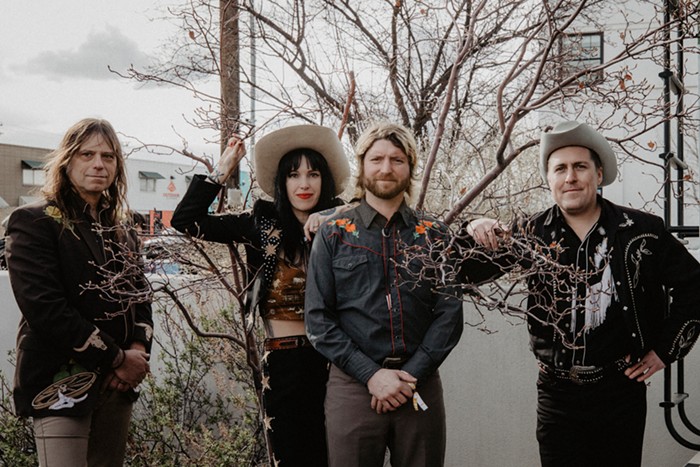THEIR SINGER looks like Teen Wolf, had he humbly returned to high school as a substitute math teacher. He's matched in the visually uncool category by the rest of the group, a haphazard gathering of ex-band geeks and record nerds bonding for a unified musical cause and perhaps safety in numbers. Yet while you'd be hard pressed to find four individuals who look less at home in the spotlight, Maps & Atlases are a band with a vision.
A really precise, nerdy vision.
"I think we are music nerds in each of our own ways," explains drummer Chris Hainey. "A lot of the stuff that we've done stems from our collective listening to technical music when we first started as a band and we've all grown up in different backgrounds that involve a lot of avid music listening." Maps & Atlases are hardly the first bunch of music geeks to take root in the fertile Chicago music scene (their place in line is closer to Joan of Arc than the Midwest days of Don Caballero), but with the Barsuk-released Perch Patchwork, the band is surely making progress in those ranks.
Maps & Atlases essentially just write pop songs, then bury them alive beneath an assortment of technical wizardry—finger tapping, polyrhythms, and all sorts of other whistles and bells (which, in the future, might literally include both whistles and bells). With buckled knees, the pop songs of Perch Patchwork strain beneath the weight of the band's ability to contort their simple structure, with the end result sounding both familiar and dreadfully confusing. After a series of EPs that merely hinted at, but never accurately captured, the band's intricate sound, Perch Patchwork is Maps & Atlases' first proper recording. Structures this complex do not come overnight, and the band labored for over a year on Perch Patchwork, taking full advantage of the studio time and their stacked-to-the-heavens method of song assembly.
"Working out a lot of the ideas in our band takes a good amount of time, but I think we all had a pretty clear focus in what we wanted, what our ultimate goal for the songs was and what we wanted them to sound like," says Hainey. "It comes about in a couple different ways; one way would be for us to all get in our practice space and jam and write parts together, then Erin [Elders] or Dave [Davison] would write lyrics and the vocal melodies would come afterward."
From there the band molds and reassembles the song structure, like the unhinged "Pigeon," which takes shape as a barren gathering of vocals and guitar notes that could have tumbled off Bitte Orca, before the song's soft crescendo of restrained percussion, jerking rhythms, and cooing vocals take over. A similar shift is felt in "The Charm," which gradually evolves from a swirling buzz—nearly the same pitch as a vuvuzela—and the soulful opening refrain of "I don't think there is a sound I hate more than the sound of your voice when you say you don't love me." From there, the song erupts in furious blasts of layered percussion and the strained vocal chords of Davison. It's one of the few moments on Perch Patchwork where Maps & Atlases (thankfully) lose focus, displaying a level of vulnerability not associated with a band known more for technical accuracy than emotional frankness.
In lieu of opening up for the listeners, Maps & Atlases are steadfast in bridging the recording gap, making sure their meticulous songs transfer from the studio to the stage. "I think there was an initial fear about these songs," says Hainey. "I'm personally excited to make records that I have no idea how we're going to do live."



















